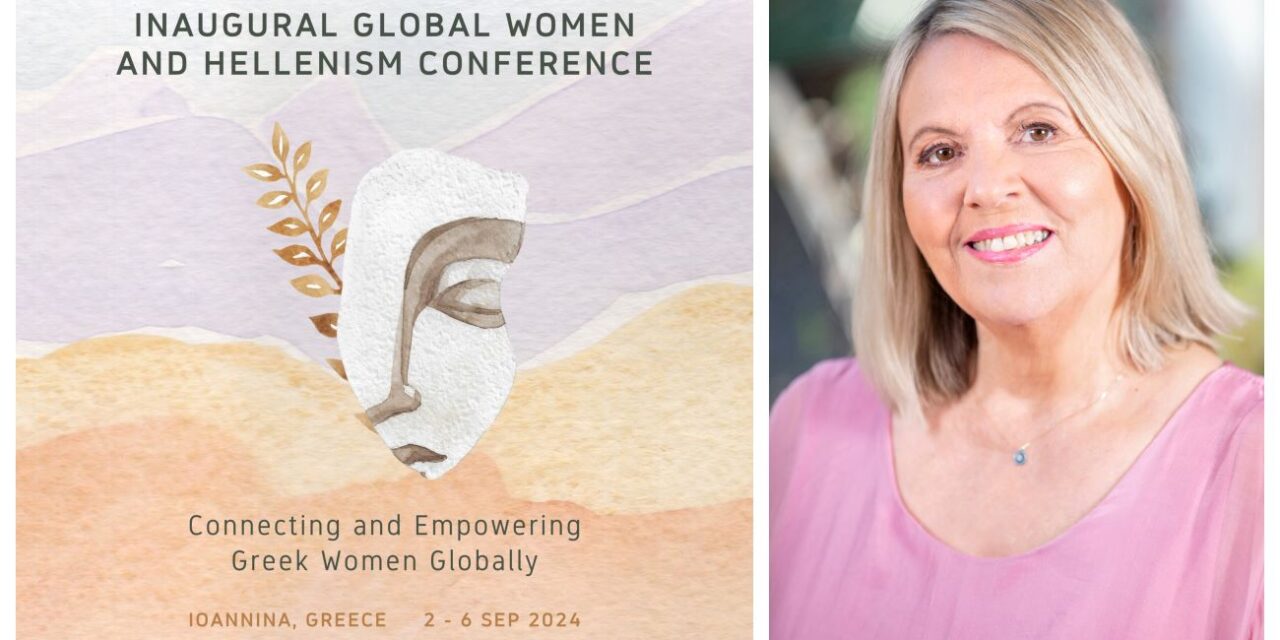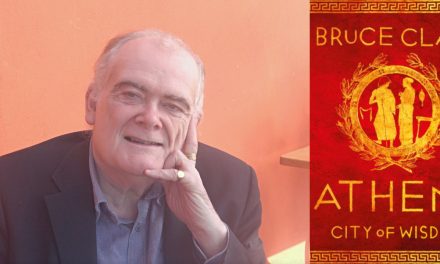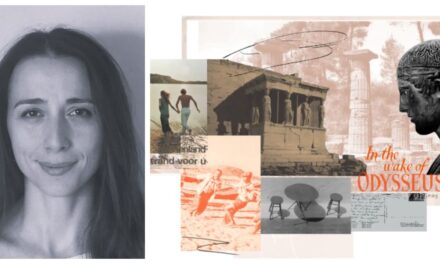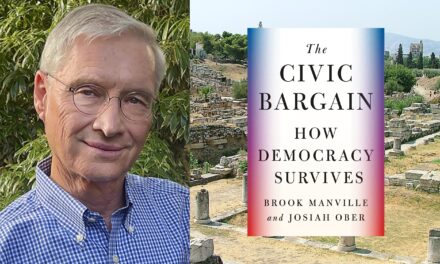Varvara Athanasiou-Ioannou AM, a dedicated educator, human resources professional, and founder of the NGO Food for Thought Network, was born in Epirus, Greece, and moved to Australia in 1972. She began her career in Victoria’s Department of Education, initially as a teacher and author of textbooks for Greek language education. Later, she became a school counselor before moving into private-sector leadership roles in human resources. She has alse served as a sessional lecturer at Swinburne University, focusing on diversity in the workplace.
In 2001, Athanasiou-Ioannou founded the Food for Thought Network with a mission to empower and connect Greek women, a commitment for which she was recognized with awards from the Victorian Honour Roll for Women and the Hellenic Australian Chamber of Commerce and Industry in 2004.
This September, Athanasiou-Ioannou and the Food for Thought Network organized the inaugural “Women and Hellenism” conference in Ioannina, Greece. Held during September 2-6, 2024, the event brought together 50 speakers, distinguished women from around the world—business leaders, scientists, authors, academics, and politicians—to discuss themes such as omen’s multifaceted identities and roles, Greek identity and heritage across generations and the sustainability of Hellenism in a global context.
The conference marked a landmark occasion in celebrating Hellenism and the role of Greek women in shaping a more inclusive and vibrant future for Hellenic culture globally.
Athanasiou-Ioannou discussed with Greek News Agenda* the impact of the Food for Thought Network in empowering Greek Australian women through community and cultural preservation. She reflects on the challenges facing the Greek Diaspora in Australia, the evolving role of women as community leaders, and her vision for an ongoing global dialogue through the Women and Hellenism Conference that can strengthen intergenerational Greek identity and foster global partnerships.
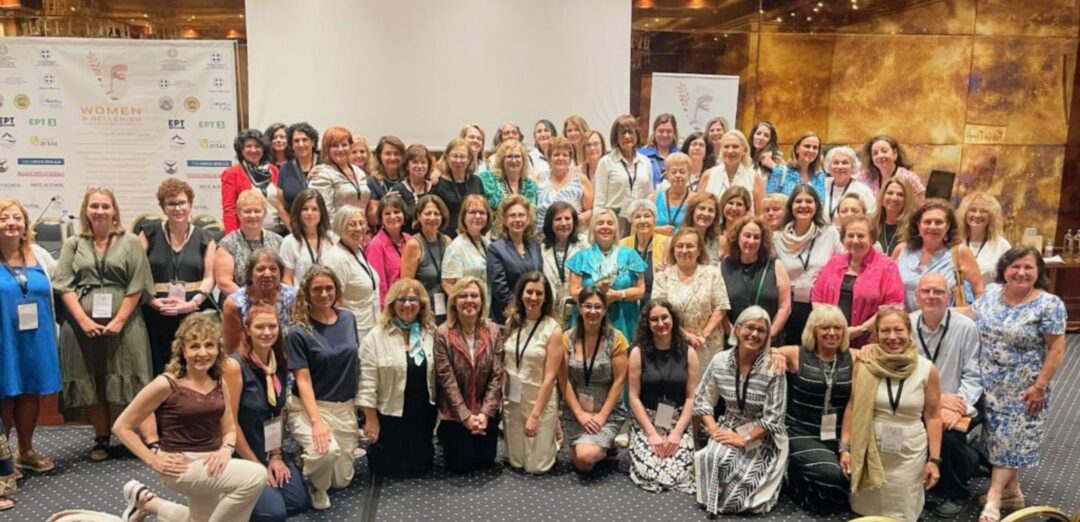
As the founder of the “Food for Thought Network,” how have you seen the organization influence the lives of Greek Australian women?
The Food for Thought Network has been a powerful catalyst for change in the lives of Greek Australian women by providing a platform for them to connect, share their stories, and offer mutual support, both personally and professionally. Through over 150 events, a Philosophy Café, an online interactive platform, and a self-published book, HER VOICE: Greek Women and Their Friends, which profiles the voices of 42 women, the network has fostered a vibrant community. Additionally, the Inaugural Global Conference has been a significant milestone in the journey.
By focusing on education and raising awareness about the barriers and enablers to women’s development, leadership, and cultural heritage, the network has supported many in strengthening sense of identity, building confidence and in pursuing ambitions. Providing mentorship opportunities, referring women to relevant organizations, offering financial support to young women seeking to improve their lives. Like Soprano Christiana Aloneftis, sharing the role of Maria Callas with Angelina Jolie in the film MARIA.
Beyond its immediate activities, the network has helped reconnect women with their cultural roots, especially those who had previously “distanced” themselves from their heritage or let go. Many now attend events related to Greek culture, seeking opportunities for involvement and connection they once avoided.
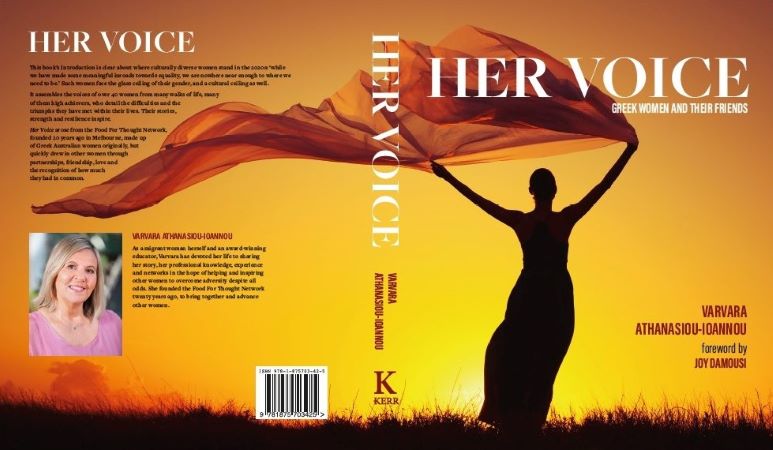
What inspired you to organize the Women and Hellenism Conference ? How does it align with the mission of the Food for Thought Network?
The Global Women and Hellenism Conference was inspired by a long-held dream of mine to unite women from Greece and the diaspora to foster stronger connections and collaboration; fueled by the success and positive reception of my book, HER VOICE: Greek Women and Their Friends Global Forum and the thriving closed Facebook group, “Greek Women and Friends Global Forum.” Both platforms highlighted the need for a global space where women of Greek heritage could come together to share stories, experiences and aspirations.
Aligned to the network’s mission, the conference was born out of a desire to celebrate and amplify the contributions of Greek women worldwide while reinforcing the cultural ties. With the aim to provide a unique opportunity for women to come together – to exchange ideas, explore their roles as leaders, cultural custodians, community change-makers, and advance women empowerment and leadership.
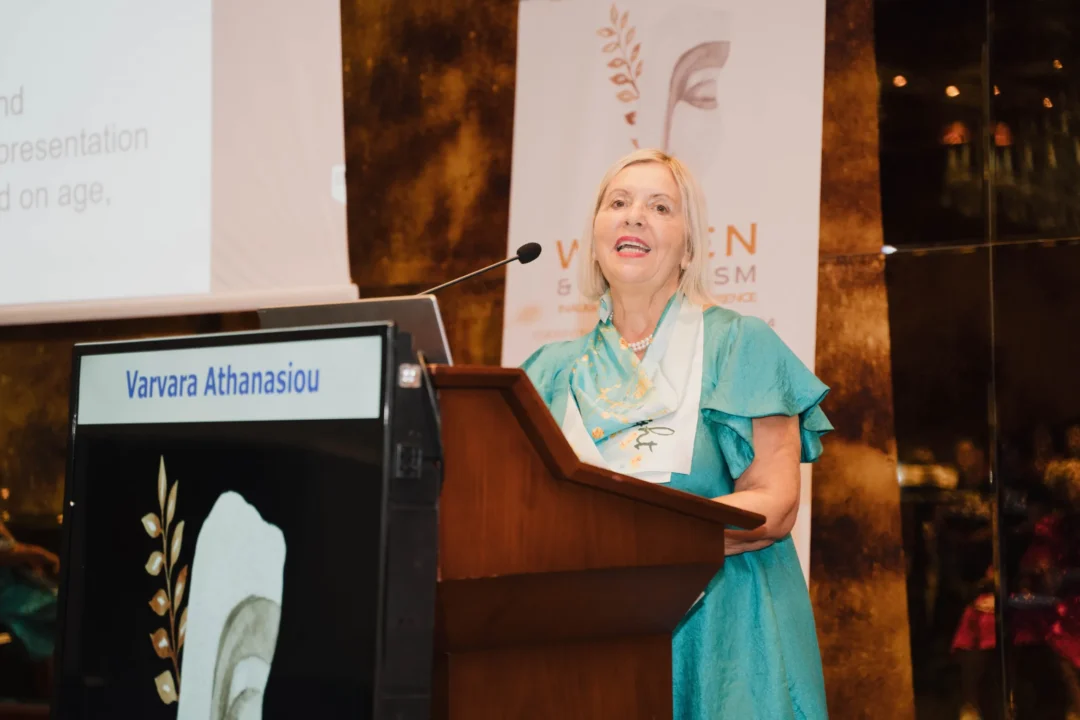
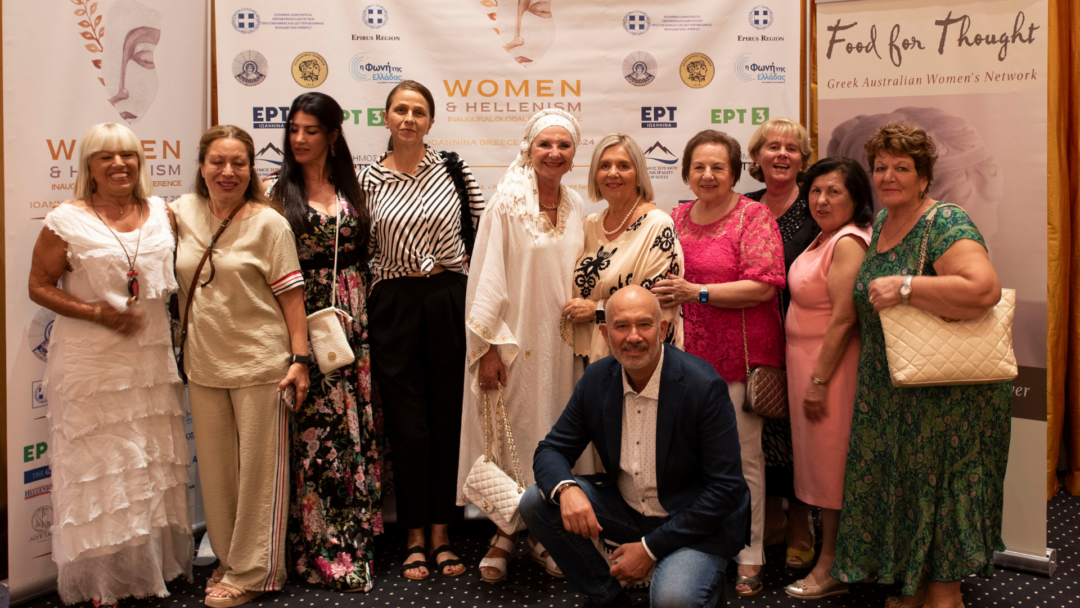
The Greek diaspora in Australia has a rich history spanning over a century. What are the biggest challenges currently facing the Greek diaspora in Australia, especially in terms of cultural preservation, integration, and identity?
The Greek diaspora in Australia, spanning over a century, faces several nuanced challenges such as cultural preservation, integration, and identity which vary significantly across generations.
For the first generation migrating in the mid-20th century, a deep anxiety exists about maintaining the Greek language and traditions. With over 400 thousand Australians of Greek descent today, (some claim 700 thousand) this generation is aging accentuated by a growing urgency to pass on their stories, customs, and values to ensure Hellenic “continuity”. There is a pressing need for community-based programs that preserve their language and culture while fostering new generational engagement.
The second generation, born and raised in Australia, faces different challenges around balancing co-existence (Australian society vs Greek cultural heritage). Many grew up speaking Greek at home while navigating a multicultural environment outside. In Victoria, Greek is still ranked higher when it comes to the language spoken at home, other than English. After Mandarin (221,798) and Vietnamese (118,801), Greek is in third place with 107,158 with a gradual erosion of the language among younger generations. This generation wrestles with maintaining identity amidst increasing cultural integration, especially as mixed marriages and diverse family structures—such as high divorce rates and single-parent households—become more common.
For the younger, third and fourth generations, growing up in an even more multicultural Australia, the connection to their Greek roots sometimes feels more distant. In a world shaped by modern global challenges, such as economic inequality and social change, cultural preservation often takes a back seat.
Ensuring younger generations stay connected to their Greek heritage, language, and traditions is a major community concern. Programs like Greek language schools, cultural/religious festivals, youth exchange programs, scholarships and community events are vital, however their reach is sometimes limited.
Without active and innovative efforts to engage youth, Hellenism sustainability is at risk. New ways of being connected to the heritage such as travel opportunities, technology, theatre, music and gastronomy were discussed at the Conference.
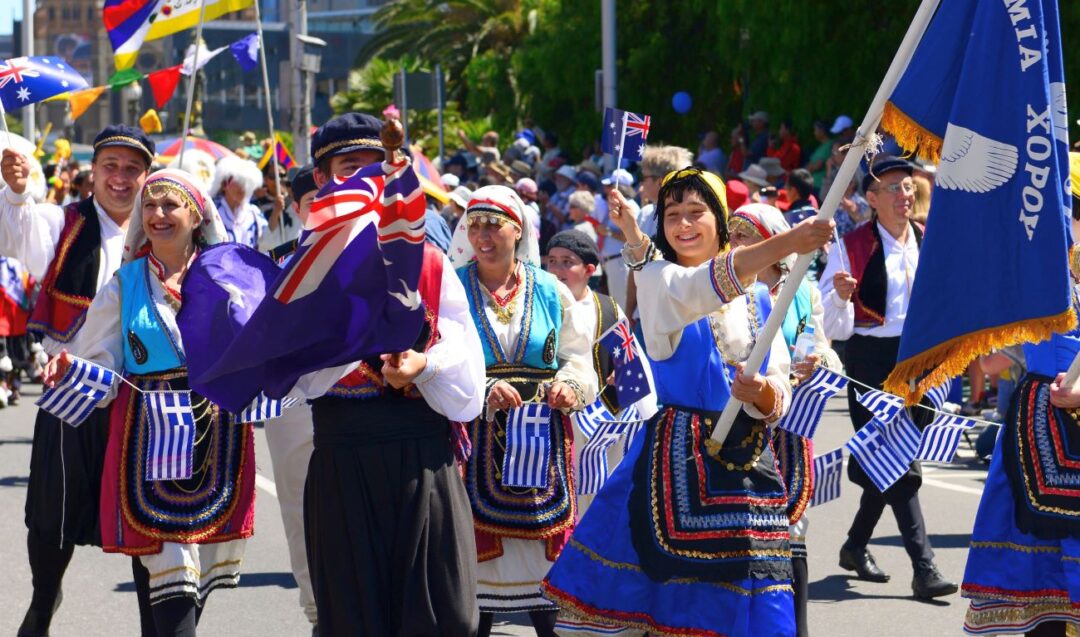
Women have always played a crucial role in maintaining cultural heritage within the diaspora. How do you see the role of women in the Greek Australian community evolving today?
Greek Australian women play a pivotal role in preserving cultural heritage within their community, often juggling careers, young children, and elderly parents, creating an exhausted “sandwich generation.” Today’s women are well-educated, independent, and highly skilled at navigating the multiple challenges they face in both their personal and professional lives.
The economic crisis in Greece led to a “brain drain,” but for Australia, it resulted in a “brain gain,” with many educated, bilingual, and well-travelled women migrating to the country. Injecting fresh energy into the community, creating new organizations and enriching the cultural and social fabric.
Currently Greek Australian women remain underrepresented in leadership roles within both mainstream and community organizations, many of which remain patriarchal. Research shows that diversity in leadership, particularly gender diversity, directly correlates with more productive, innovative, and financially successful organizations. Studies by McKinsey and Catalyst have found that companies with higher levels of gender diversity on their boards outperform those with lower diversity by as much as 15-25% in financial returns.
Women-led not-for-profit service provider organizations, such as Pronia, Frondidha Care, and AGAPI Care in Melbourne, helmed by Greek Australian women, are thriving because they benefit from the leadership and decision-making approaches women bring; emphasising collaboration, inclusivity, and long-term strategic vision.
As Greek Australian women increasingly step into leadership roles across various sectors, as culture carriers they juggle the preservation of Greek traditions while advocating for gender equality and empowerment. Shaping the narrative of what it means to be both Greek and Australian and vice versa: blending tradition with modernity and driving positive change and impact within their communities and beyond.
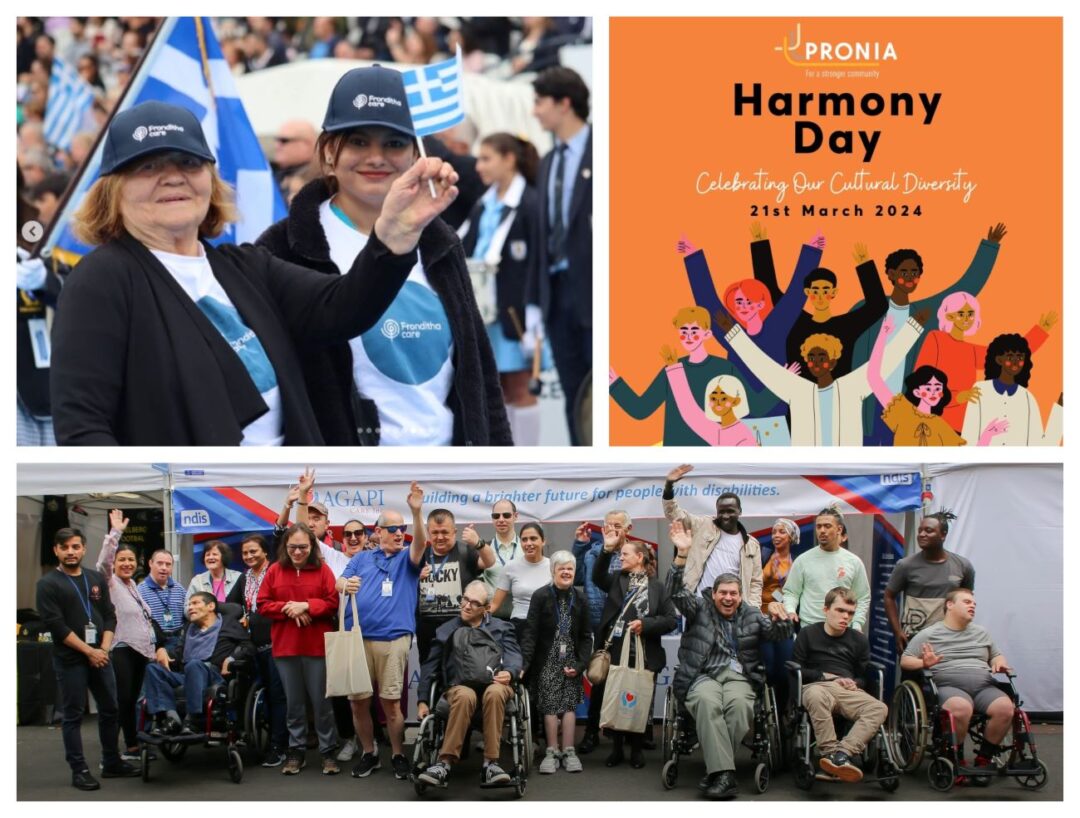
In your experience, how have Greek Australian women acted as cultural ambassadors both in Australia and Greece? Are there any stories or individuals that stand out to you?
Greek Australian women, as culture carriers, are actively engaged in professional spheres and play a vital role in preserving Greek traditions through community events, educational initiatives, and cultural festivals. Notably, many have championed causes like bilingual education, ensuring that younger generations not only learn Greek but also embrace the richness of their heritage.
There are numerous examples of women who have excelled in leadership across various fields. Professor Vasso Apostolopoulos, a globally recognized immunologist, Associate Professor Magdalena Simonis AM, a national advocate for women’s health, Professor Catherine Itsiopoulos an advocate on the mediterranean “diaita”, prominent journalists Helen Kapalos and Patricia Karvelas, are just a few. Others, such as festival director Nia Karteris, Violet Roumeliotis AM have influenced government policies related to refugees and asylum seekers, and Chanel Contos who successfully advocated for consent to be included in sex education, stand out.
Politicians like Maria Vamvakinou, Jenny Mikakos and accomplished academics such as Professor Joy Damousi, Judge Nola Karapanagiotidis along with numerous businesswomen. Like Global diversity consultant Maria Dimopoulos AM, Penny Sahinis who mentors top female leaders who take a seat at the IMF and G20 table. Leading researchers and academics recognised for their significant contributions both in Australia and internationally.
Their efforts as leaders and advocates exemplify the essential role they play in connecting and enriching both cultures whilst advancing reforms in their field of work and creating noteworthy impact.
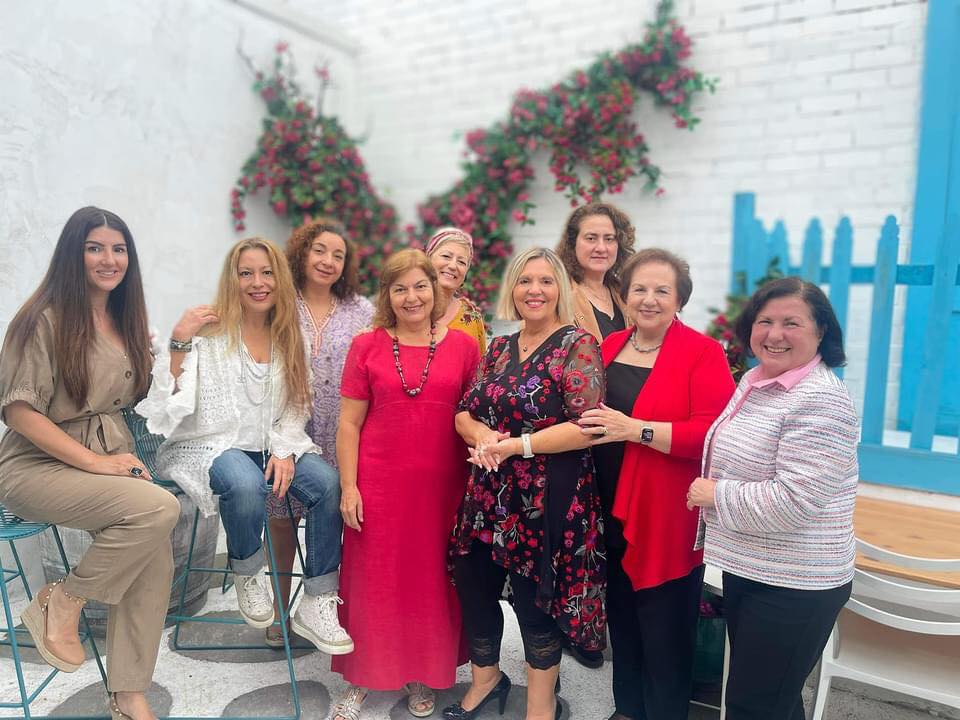
Looking forward, what is your vision for the Women and Hellenism Conference? How do you believe we can foster a deeper intercultural exchange and understanding of Hellenism, both within Greece and in the diaspora communities abroad?
The future of the Women and Hellenism Conference lies in expanding its reach and depth through ongoing dialogue between women in Greece and diaspora and reporting on tangible outcomes and impact.
A permanent global network of women who can collaborate across countries, sectors, and cultures to promote Hellenism and the role of women in leadership is nested with the vision.
Requiring financial support of the Greek Government to continue with regular global conferences in Greece (with economic benefit) and fostering intercultural exchange through mentorship programs, scholarships, cultural/business exchanges via collaborative projects to sustain Hellenism. As an aside, we can also play a role in facilitating strategic partnerships across academia, business and NGO level.
As I look back to on the conference, the women of the Greek diaspora arrived and were visible to their compatriots who were surprisingly taken aback and, equally, enveloped in our multifaceted identities.
So much to do we’ve just only started.
* Interview to Ioulia Livaditi
Read also from Greek News Agenda
- Rethinking Greece | Nicholas Doumanis on the last century of Greek history: Greeks are resilient and resourceful
- Book of the Month: ‘Forty Photographs: A Year at a Time’ by Effy Alexakis
- Migration Routes: First Greek Australian Archive Underway
TAGS: DIASPORA | GLOBAL GREEKS | GREEK AUSTRALIANS | WOMEN & GENDER

